A Deep Learning-Facilitated Radiomics Solution for the Prediction of Lung Lesion Shrinkage in Non-Small Cell Lung Cancer Trials
Antong Chen, Jennifer Saouaf, Bo Zhou, Randolph Crawford, Jianda Yuan, Junshui Ma, Richard Baumgartner, Shubing Wang, Gregory Goldmacher
-
Members: FreeSPS
IEEE Members: $11.00
Non-members: $15.00Length: 14:07
03 Apr 2020
Herein we propose a deep learning-based approach for the prediction of lung lesion response based on radiomic features extracted from clinical CT scans of patients in non-small cell lung cancer trials. The approach starts with the classification of lung lesions from the set of primary and metastatic lesions at various anatomic locations. Focusing on the lung lesions, we perform automatic segmentation to extract their 3D volumes. Radiomic features are then extracted from the lesion on the pre-treatment scan and the first follow-up scan to predict which lesions will shrink at least 30% in diameter during treatment (either pembrolizumab or combinations of chemotherapy and pembrolizumab), which is defined as a partial response by the Response Evaluation Criteria In Solid Tumors (RECIST) guidelines. A 5-fold cross validation on the training set led to an AUC of 0.84 ñ 0.03, and the prediction on the testing dataset reached AUC of 0.73 ñ 0.02 for the outcome of 30% diameter shrinkage.



